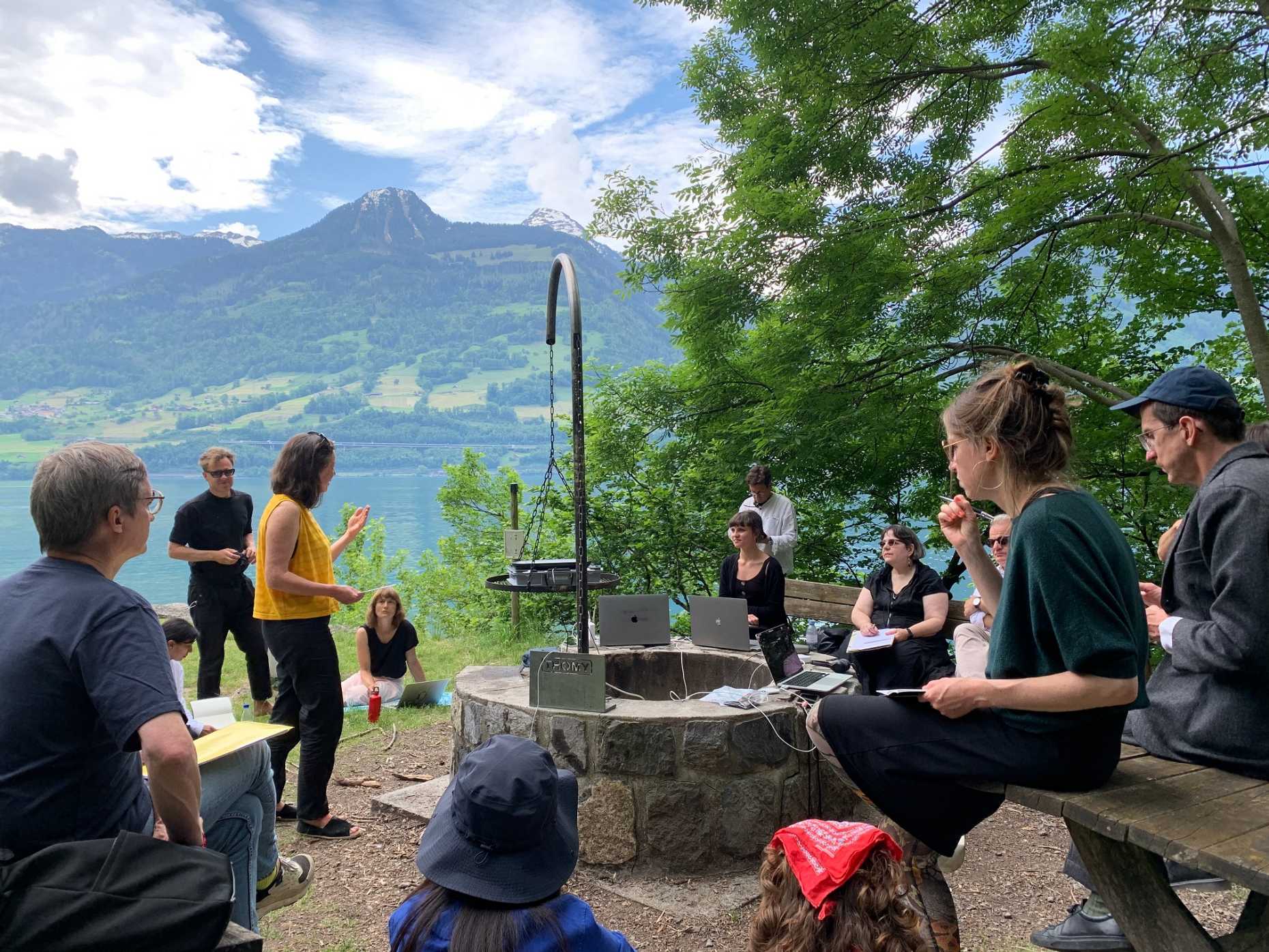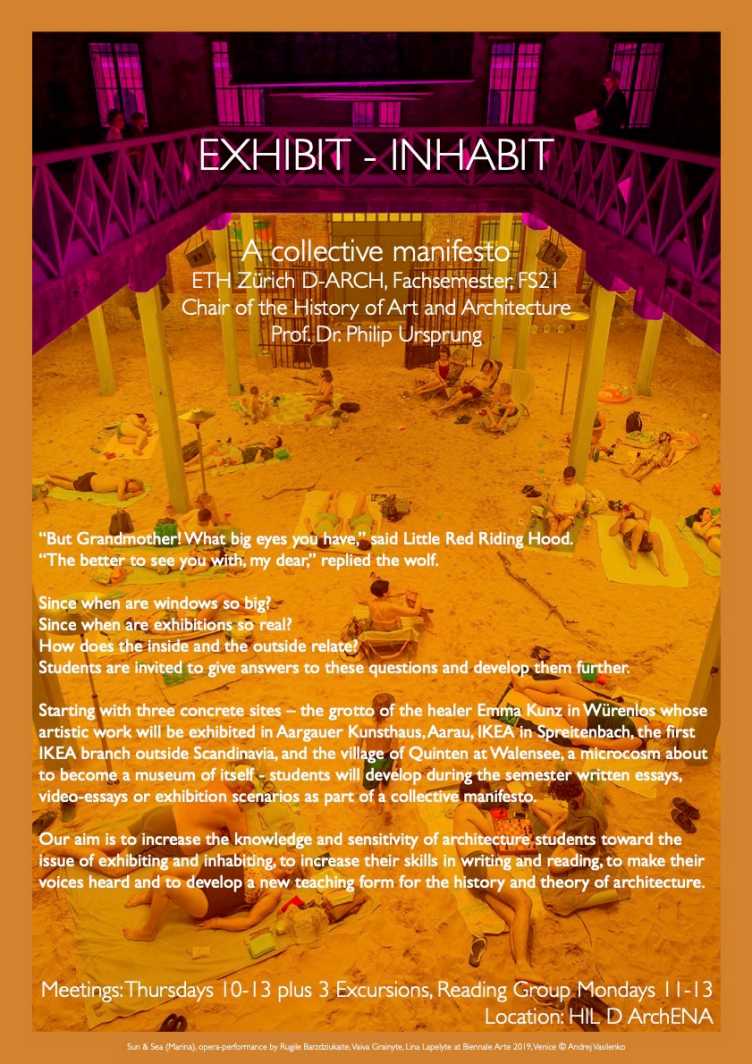Lehre in Zeiten der Pandemie
The Covid-19 pandemic is a tragedy for innumerable people worldwide. Like every historical crisis, it is also a mirror which makes one perceive the own situation more clearly and forces one to decide on priorities. What shall we keep, what should we change? The aim of our group of the Professorship of the History of Art and Architecture was to make teaching better after than before the crisis.
Our priority was to enable students during the pandemic to continue to be regularly in touch with each other and the teaching team. In our view, horizontal learning, the interaction among students, is at the very core of education. The exchange, and particularly the informal exchange, before and after teaching sessions is essential to the culture of learning.

Implementation of the course during the time of distance learning
In 2020, D-ARCH introduced a new teaching format, the “Fachsemester.” The design studio as the most effective teaching format which allows to focus on a common topic for an entire semester and consists of a close cooperation between student groups (15 – 45 students) and which is credited 14 points, is traditionally the privilege of design professors. Following the demand from students for a wider choice in subject matters, namely architecture technology, architecture history and theory, this format was opened for professors of other institutes. The Fachsemester is currently evaluated in order to decide if this format can be permanently included in the curriculum.
We gave an overall theme: “Take Care: A Collective Manifesto” in HS 2020 and “Exhibit – Inhabit: A Collective Manifesto” in FS 2021. We intended to make productive the different regulations imposed in view of protecting the members of ETH. The move to the home office increased existing inequalities and effected many students. When access to campus was prohibited, we decided to follow the rules of the Federal Council, which allowed “spontaneous gatherings” of 5, later 15, persons in public space. During HS 2020 and FS 2021 the public space became our campus and our group “spontaneously” met outdoors at different sites. For instance, in front of various artworks in public space in Zurich, for a hike from Zurich to Spreitenbach to visit the outside of closed IKEA, a walk to Lägern to visit ETH’ climate monitoring station, or the Emma Kunz grotto in Würenlos. An exemplary case was the visit to the tiny village of Quinten, at the Walensee. The teachers at the shore addressed the students passing by in groups of four on a boat by megaphone.
The aim of our Fachsemester was to enhance the capacity of architecture students in writing their own texts on the one hand, in discussion theoretical positions on the other hand. Each week, two sessions took place. The Monday reading session, which took place mostly online, was devoted to discussing a variety of theoretical texts from a syllabus. The online-format which lacks the traditional hierarchical order in a classroom was appropriate: We found that students tended to speak very freely, also about personal issues. At some moment, the discussion hardly needed a moderation by the teaching staff.

The Thursday session took place outdoors and was devoted to the presentation of the individual writing. Students presented their work to each other and discussed it commonly. Feedback was not only given by teachers but by the entire group. The occasionally difficult conditions due to cold weather or ambient noise made the group aware of the performative nature of communication: One needs to find methods to make one’s voice heard!
We gave the students much freedom to choose their forms and media. Some handed in video-essays, other entire books with their texts. Guest critics from literature, journalism, philosophy and architectural design gave feedback.
While all sessions were open to the entire group of students and the entire teaching staff, individual feedback sessions were offered as well.
Grading was done by the entire teaching staff group. As the average grades of the Fachsemester in HS 20 were considered too high by the Professorial Conference, a more sever grading was used in the Fachsemester in spring 2021. Criteria were the consistency and originality of the texts, the engagement in the meetings and the language skills. Students were free to choose the language. Most texts were in German, some in English. Two students had inserted passages in their native tongue Rhaeto-Romanic and Mandarin.
Every phase of teaching was accessible online. Students or teachers unable to attend the gatherings remained present virtually. This was easy as all the members of the group had a device and were connected to each other via Zoom.
Course description
Overall concept of the course before the pandemic - during - after
By chance, the introduction of the Fachsemester as new teaching format at D-ARCH coincided with the pandemic. We used it as a model for alternative modes of teaching. Priority was given to the possibility of students to actually meet each other and be in contact with the teachers. Safety rules and restrictions were made productive.
Prior to the pandemic, excursions had already played an important role in our teaching. The Seminarwoche which takes place at D-ARCH every semester has traditionally been our experimental site for new forms of interaction, a moment, where research (new themes) and teaching (new formats) meet. Attention of students and teachers is particularly strong during trips. The critical reflection on one’s practice takes place when students and teachers temporarily leave their routine. Mini-excursions of two to three hours in Zurich, or even on the Hönggerberg campus, traditionally belong the education.
In view of the reduction of flights, we had started working on hybrid models prior to the pandemic. The pandemic has accelerated this work. With funds from Innovedum, we are developing a method where one part of a group travels, while the other stays at home, connected by Zoom. The exchange on the actual and the virtual experience of the trip then will take jointly.
Teaching the Fachsemester in hybrid mode has improved the capacity of students and teachers to deal with virtual exchange. It proved fruitful that every member of the group had a device. Communication is much more effective than if there is only one screen that all members look at. Vivid discussions depend on the possibility to react directly. In many sessions it became difficult to decide who was actually present and who was participating virtually.
The outcome of the Fachsemester are physical objects, mainly booklets which text by students. The tangible object stands in contrast to the virtual devices, yet if offers something which students can later include in portfolios and show to others.
The subtitle “Collective Manifesto” points at the intention to relate education and action. Traditionally a format where intellectuals make their voice heard, it is an encouragement to engage in times of crisis.